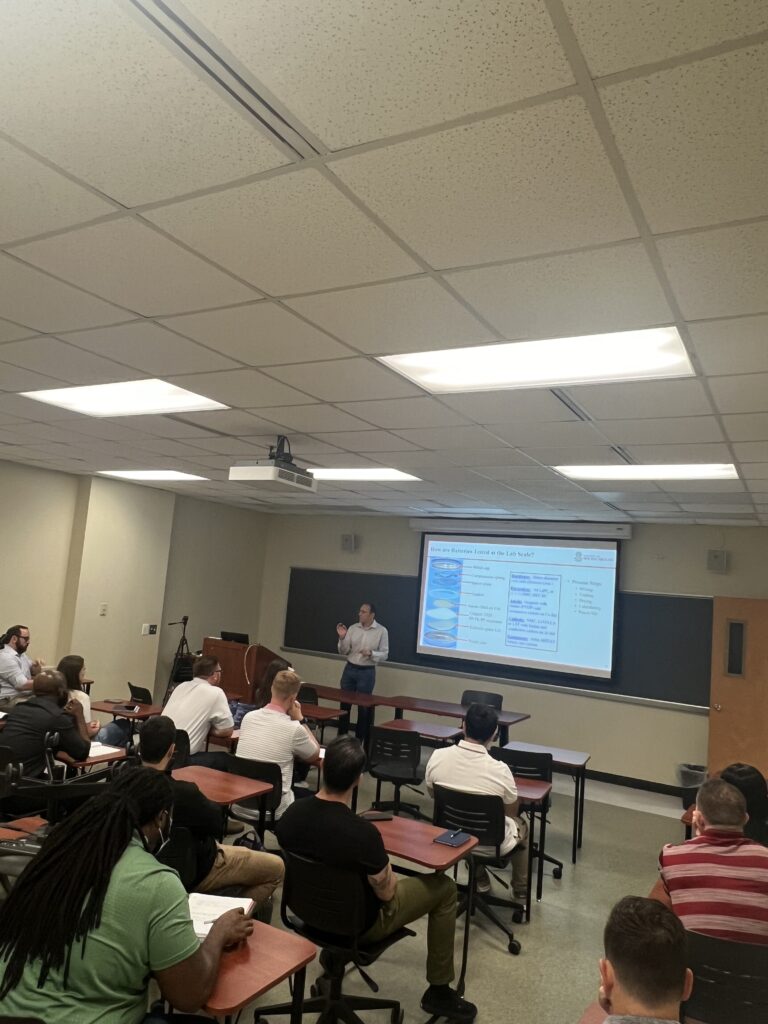
Like mini-energy vaults, batteries “bring good things to life” and hold the power to light up our world, run our appliances and gadgets, and make our lives better. The high caliber work and impact of the Strategic Innovation Certificate students from this summer’s MGMT 775 Strategic Analysis and Application of Innovation course at the University of South Carolina (USC) will be felt beyond the end of the semester, building off of the substantial momentum surrounding battery technology in South Carolina. The course, led by Kevin Diana, MBA, is offered by the Darla Moore School of Business through SC Innovates® the SmartState® Center for Innovation + Commercialization. This summer, SC Innovates® partnered with the U.S. Economic Development Administration (EDA)-funded Carolina Institute for Battery Innovation (CIBI), helmed by Professor William E. Mustain, Ph.D. This collaboration represents a significant milestone for USC and the broader South Carolina community, continuing to generate momentum in battery advancements that has been years in the making.

Professor Mustain is an Associate Dean for Research and Professor of Chemical Engineering in USC’s Molinaroli College of Engineering and Computing (MCEC), where he and his team work on ways to boost overall battery performance through electrochemical research. His group is one of many in MCEC and the USC College of Arts and Sciences working on many aspects of battery science, technology and implementation. Overall, nearly 100 USC faculty and students are working on batteries, making battery technology a core strength of the university. The MGMT 775 summer 2024 cohort worked in three dynamic teams, embarked on a journey that was entirely experiential with CIBI, making this course a standout among the Professional MBA (PMBA) offerings. The students worked closely with Professor Mustain and his team, immersing themselves in a real-world project that revolved around analyzing multiple financial models for CIBI. This hands-on approach offers students a uniquely challenging learning experience allowing them to apply lessons learned and augment their strategic innovation toolbox that is crucial in today’s rapidly evolving technological landscape. As we know, batteries are the unsung heroes of our tech-savvy lives, silently powering our way through each day.
Laura B. Cardinal, Ph.D., Director of SC Innovates®, expressed her excitement about the partnership, highlighting its significance in enhancing the students’ learning experience. “This collaboration with the Carolina Institute for Battery Innovation is a testament to our commitment to providing students with practical, real-world experiences. It’s not just about learning theories; it’s about applying them in meaningful ways,” she said.

Over the summer semester, the three teams met for three Saturday sessions, two in Columbia and one online. The first Saturday kicked off with lab tours, demonstrations by MCEC graduate students, and a presentation by Professor Mustain. This project not only encouraged innovative thinking and problem-solving skills, but also provided students with hands-on experience in a field critical to our future energy needs. Understanding how USC fits into the bigger picture within the battery sector was key to drive home what is at stake.
“The nature of an experiential course like this means every semester is different. This time, our context positioned the students with an opportunity to meaningfully add to South Carolina’s momentum that continues to evolve around batteries,” reflects Diana on his students’ work. “We were truly living a live business case, and our students rose to challenge.”

Professor Mustain praised the students’ dedication and the quality of their work. “The Moore School students brought fresh perspectives and innovative solutions to their proposals. Their contributions have been remarkable, and it’s clear that they have gained a deep understanding of the complexities and potential of battery technology,” he noted. “What makes this all the more impressive is how they are full-time working professionals and students only part-time.”
A key component of the teams’ analysis during the summer term was the pilot manufacturing facility that will be a cornerstone activity for CIBI, which will advance battery technologies developed in South Carolina and across the United States through invention, development, integration and demonstration. The CIBI is part of the larger SC-Nexus ecosystem that is being led by the SC Department of Commerce; Professor Cardinal also participated in the SC Nexus submission for federal EDA funding earlier this year.
“The CIBI project challenged our cohort to think strategically about framing a resilient business model in a rapidly evolving sector. Working as a class on a live business case that will have a significant impact on the future of the University and my home state of South Carolina has been particularly rewarding and one of the highlights of my Professional MBA experience,” says student Colin Meachem on the news. “We’re thrilled to see the SC Nexus and CIBI receive such overwhelming support, positioning the state and the University of South Carolina as leaders in battery technology and innovation.”
The partnership between SC Innovates® and the Carolina Institute for Battery Innovation marks a significant achievement for USC and the state of South Carolina. It reflects a growing commitment to fostering technological advancements and supporting sustainable innovation. This summer’s MGMT 775 cohort not only highlights the value of USC’s experiential learning programs, but also the university’s position as a leader in battery technology R&D and workforce development.
The state’s blossoming role in the electric vehicle and battery sectors will continue to have momentum that is generated by this partnership.
“This will position South Carolina to further drive advancements within this emerging industry,” says Cardinal. “We have now solidified a position as a hub for this cutting-edge technology and I am thrilled that USC and its outstanding Centers and Institutes are at the forefront of it. I commend our students and their incredibly hard work that is allowing us to shine brightly on a national stage.”